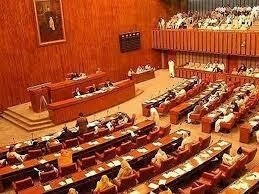PTBP Web Desk
The Senate of Pakistan approved amendments to the Prevention of Electronic Crimes Act (PECA) Bill, 2025, marking a significant moment in the country’s legislative approach to digital governance. Moved by Minister for Industries and Production, Rana Tanveer Hussain, on behalf of Interior Minister Mohsin Naqvi, the bill is now poised to become law pending the president’s approval.
The journey of the PECA Amendment Bill, 2025, through the legislative bodies was swift. After securing a majority vote in the National Assembly, the bill was promptly presented in the Senate the following day. The Senate Chairman then referred it to the Standing Committee, which, under the leadership of Senator Faisal Saleem Rehman, passed it on Monday, as moved by Law Minister Azam Nazeer Tarar. This legislative momentum indicates a strong governmental push to enact these changes swiftly.
The amendments introduce stringent measures against the spread of false and fake information on social media. The legislation proposes penalties that include imprisonment for up to three years or a fine of up to two million rupees, or both. A pivotal aspect of the bill is the establishment of the Social Protection and Regulatory Authority, tasked with overseeing the digital space. This authority would have the power to act rapidly on complaints regarding misinformation, with mandates to remove or block access to such content within 24 hours of receiving a complaint.
The passage of these amendments has not been without controversy. The Pakistan Federal Union of Journalists (PFUJ) has been vocally critical, labeling the amendments as draconian and aimed at stifling free speech, independent media, and social media platforms. In a press release, the PFUJ expressed dismay over the lack of consultation with stakeholders before the amendments were passed, despite previous appeals for such discussions.
In response to the Senate’s decision, the PFUJ has declared a strike and called for nationwide protests at press clubs across Pakistan at 3 PM today. This move underscores the significant opposition from media professionals who fear these laws could be used to suppress dissent and control narratives under the guise of combating misinformation.
The PECA amendments represent a pivot towards tighter control over digital content, raising concerns about freedom of expression and privacy rights. Critics argue that the vague definitions of “false and fake information” could lead to misuse of power, potentially targeting journalists, activists, and ordinary citizens who express views contrary to those of the government or other powerful entities.
Freedom of Speech: The establishment of an authority with the power to quickly censor content might deter open discourse, especially on social media platforms where anonymity often allows for freer expression.
Digital Surveillance: There’s a fear that this could lead to increased surveillance, with the government gaining more tools to monitor online activities under the banner of maintaining public order.
Legal Challenges: The legal battles over what constitutes “fake news” could become frequent, potentially overwhelming judicial systems and discouraging investigative journalism.
As the bill awaits presidential assent, the dialogue around digital rights in Pakistan intensifies. The government’s stance is that these measures are necessary to curb the rampant spread of misinformation that can lead to social unrest. the opposition, particularly from the journalism community, sees this as an overreach, potentially damaging the democratic fabric by limiting free speech.
The outcome of today’s protests and the broader public’s reaction to these amendments will be crucial. Will there be a rollback or modification of these laws in response to public outcry, or will they stand as a testament to the government’s determination to regulate digital spaces more stringently? The narrative around digital rights in Pakistan is at a critical juncture, with potential long-term impacts on how information is shared, consumed, and controlled in the digital age.




